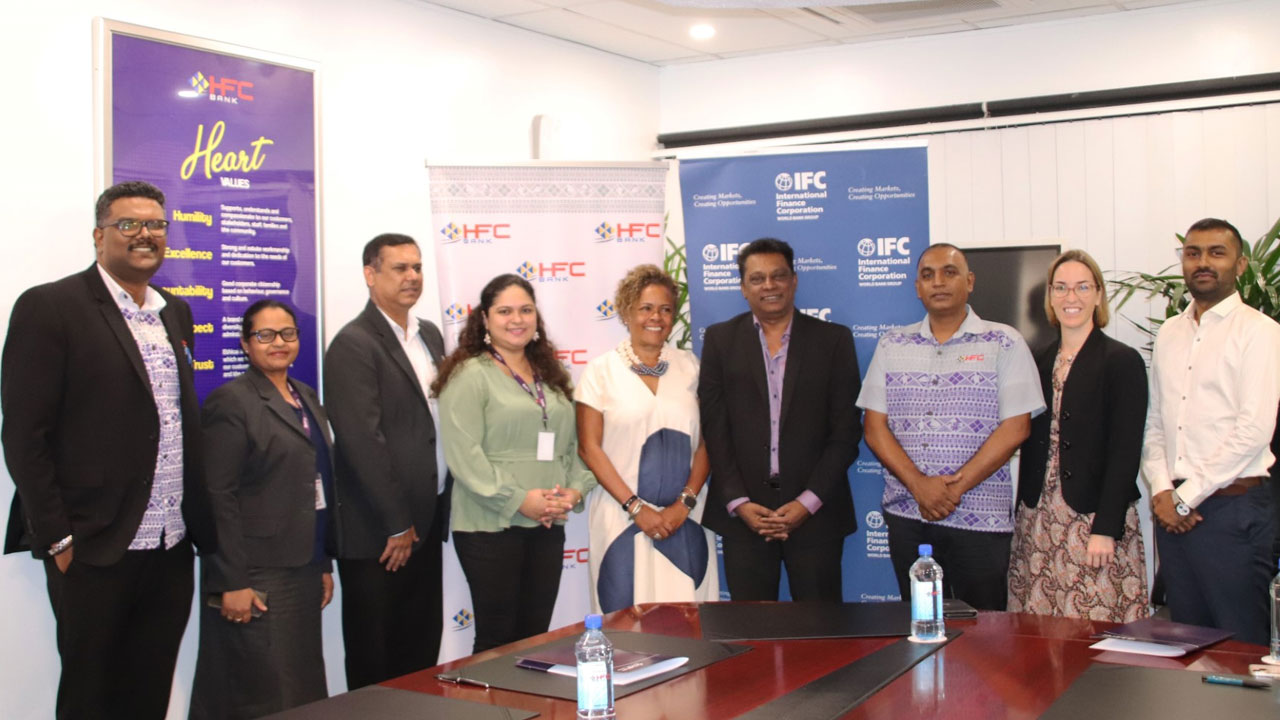Fijian importers and exporters will have greater access to finance under a partnership between the International Finance Corporation (IFC) and HFC Bank that’s expected to boost trade and support economic growth and jobs in Fiji.
Under an agreement announced today, IFC, a member of the World Bank Group and the largest global development institution focused on the private sector in emerging markets, will invest up to US$5 million in HFC Bank to support its growing its trade finance operations. The investment, in the form of a trade finance facility, will also address a trade finance gap that widened as a result of the COVID-19 pandemic.
As Fiji’s only locally owned Bank, HFC Bank provides a crucial service to Fijian importers and exporters, and in particular micro, small and medium-sized enterprises (MSMEs).
“Being a Fijian Bank, we are delighted and extremely proud to be able to collaborate with IFC on its global trade finance initiative,” said Rakesh Ram, HFC Bank CEO.
“HFC Bank believes in delivering best quality solutions and value propositions to its customers. We have extended our capabilities to better serve all our customers on a global scale with over 300 financial relationships offered under this initiative.”
“International banks had consistently de-risked Pacific financial institutions, which had become a major hurdle for local players like HFC Bank. We are making every effort to address this both through international partners like IFC and at the government level. We have made significant progress in this regard and this partnership with IFC is testimony to our efforts and evidence of our capability and capacity,” Ram said.
“This connection with IFC will provide our clients with broad access to trade financing networks, additionally contributing towards a sustainable Fijian economy through its own bank. HFC Bank is determined to expand its financial and global trade platform, as well as its resilience in international markets.”
The investment announced today under the World Bank’s Global Trade Finance Programme (GTFP) is aimed at resolving a situation by which banks in emerging markets such as Fiji have been facing ongoing challenges in the availability of financing to support their customers. These are traders exporting or importing commodities. Banks like HFC Bank depend on global confirming banks to provide trade financing for their customers. However, due to limitations such as individual counterpart or geographic line limits, increased capital reserve requirements, and other perceived risks. Many confirming banks have been unable to meet the needs of their existing and potential counterparts in emerging markets.
In 2020, this unmet potential trade financing or the ‘Trade Finance Gap’ was estimated to have increased to US$1.7 trillion during the COVID pandemic from US$1.5 trillion in 2018. The situation is the same for banks in Fiji where SMEs account for 18 per cent of GDP. Hence, the announced GTFP will provide trade finance support to HFC Bank and its trade finance customers by providing IFC’s guarantee through risk mitigation to its counter-party banks, and thereby making the trade-flows happen.
“Access to trade finance is crucial for businesses to compete in the global marketplace and we are delighted to be partnering with HFC Bank with this initiative,” said Judith Green, IFC Country Manager for Australia, New Zealand, Papua New Guinea, and the Pacific Islands.
“By leveraging our expertise and resources, we are not only creating a better investment climate and strengthening the financial infrastructure in the country but also increasing access to finance for MSMEs which are critical for jobs and growth in Fiji. I would also like to acknowledge the support we receive from the Australian Government which is critical to projects like this and our broader development objectives in Fiji.”
The investment in HFC Bank is aligned with the World Bank’s strategy for Fiji which includes a focus on fostering private sector-led growth and inclusive economic opportunities. It also responds to the need for increased access to finance for MSMEs which is a priority under Fiji’s National Development Plan (2017-2036).
“We are pleased to partner with IFC’s GTFP to support greater access to trade finance for HFC Bank,” said Hiroshi Matano, MIGA Executive Vice President.
“Supporting small states is a key priority for MIGA, and we believe that this initiative will help HFC Bank to better support local importers and exporters.”
MIGA works with IFC to facilitate access to trade finance by providing guarantee capacity for state-owned banks through a joint Trade Finance Guarantee Initiative. The GTFP network is critical to help maintain access to finance in markets that are experiencing cross-border retrenchment and help the TF infrastructure cover.
IFC anticipates that in Fiji, (a country with exports to GDP of 18.9% and imports to GDP of 39.5 percent), the GTFP will enhance the flow of essential goods, preventing a potential crisis, further building resiliency in the market’s development trajectory.
As part of its commitment to sustainable development, IFC emphasizes the importance of fostering resilient financial ecosystems in emerging markets. By collaborating with institutions like HFC Bank, IFC aims to support economic diversification, create employment opportunities, and ultimately improve the quality of life for Fijians.
SOURCE: IFC/PACNEWS














